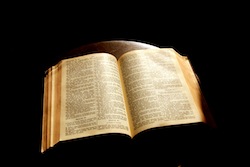CARL WATTS & ASSOCIATES
November 11, 2013
|
Washington DC
|
tel/fax 202 350-9002 |
|
Like farmers or the military, clergy members constitute a special chapter in the IRS tax regulations.
|
|
In order to be classified a clergy, a minister should satisfy five separate tests:
 |
|
|
|
|
|
|
|
|
|
|
|
|
For income tax purposes, a licensed, commissioned, or ordained minister is generally treated as a common law employee of his or her church, denomination, or sect. |
|
So, except for traveling evangelists who may be treated as independent contractors, if you are a minister performing ministerial services, you are taxed on wages, offerings, and fees you receive for performing marriages, baptisms, funerals, etc. |
| Depending on all the facts and circumstances, under common-law rules you are considered either an employee or a self employed-person. Generally, you are an employee if the church or organization has the legal right to control both what you do and how you do it, even if you have considerable discretion and freedom of action. If you are employed by a congregation for a salary, you are generally a common-law employee and income from the exercise of your ministry is considered wages for income tax purposes. |
|
However, the salary you receive from the congregation for services as an employee is subject to self-employment tax. Moreover, amounts received directly from members of the congregation, such as fees for performing marriages, baptisms, or other personal services, are considered self-employment income. |
|
All in all, members of the clergy can be treated as employees and as contractors for the same job. |
| In most circumstances the amount of the minister’s income that is subject to the self-employment tax includes the base salary, the housing allowance, and the fair rental value of church provided housing, if any. |
| Since members of the clergy are considered self-employed for the purposes of Social Security and Medicare taxes, the church does not withhold Social Security and Medicare taxes from a pastor's salary the way it does for lay employees. Likewise, the church does not have to pay the employer's share of Social Security and Medicare taxes for the pastor as it does for lay employees. |
|
Troubles viewing this message? View in browser online here
|

| Clergy are not subject to mandatory federal tax withholding, however, the minister may elect to voluntarily have the church withhold these taxes in lieu of filing quarterly personal estimated taxes. Clergy are required to file Schedule SE with their Form 1040 to calculate the self-employment taxes for Social Security and Medicare. |
|
A minister's housing allowance, sometimes called a parsonage allowance or a rental allowance, is excludable from gross income for income tax purposes, but not for self-employment tax purposes. The Housing Exclusion Allowance amounts, however, are subject to Social Security and Medicare taxes, and must be added to taxable salary by the pastor for calculating taxes due on Schedule SE. |
| If you own your home, you may still claim deductions for mortgage interest and real property taxes. If your housing allowance exceeds the lesser of your reasonable salary, the fair rental value of the home, or your actual expenses, you must include the amount of the excess as other income. |
|
Even though, for Social Security tax and Medicare tax purposes, you are considered a self-employed individual in performing your ministerial services, you may be considered an employee for income tax or retirement plan purposes.
 |
| For income tax or retirement plan purposes, some of your income may be considered self-employment income and other income may be considered wages. |
| Ministers, members of religious orders who have not taken a poverty vow, practitioners of Christian Science and members of religious sects that are recognized by the United States government are able to request an exemption from paying self-employment taxes. To qualify for the exemption, the filer cannot have elected in the past to be included in the Social Security program and must file Form 4029 with the IRS. You cannot file for the exemption unless you or your denomination has conscientious objections to public social programs, nor can you apply for the exemption based on economic reasons. |
|
For more detailed information you can check Publication 517, Social Security and Other Information for Members of the Clergy and Religious Workers, for limited exceptions from self-employment tax. |
| Clergy can deduct the expenses they incur as an employee using a Schedule A form. The IRS considers the deductions as miscellaneous items and subjects them to a limit of 2 percent of your adjusted gross income. Business expenses can include mileage, clothing (if it is worn only when performing ministerial duties) and health insurance costs. As self-employed, they can deduct business expenses on Schedule C. |
|
Because of laws concerning the separation of church and state, taxes on members of the clergy can be difficult to compute, so help from a tax professional is again a worthwhile investment.
|